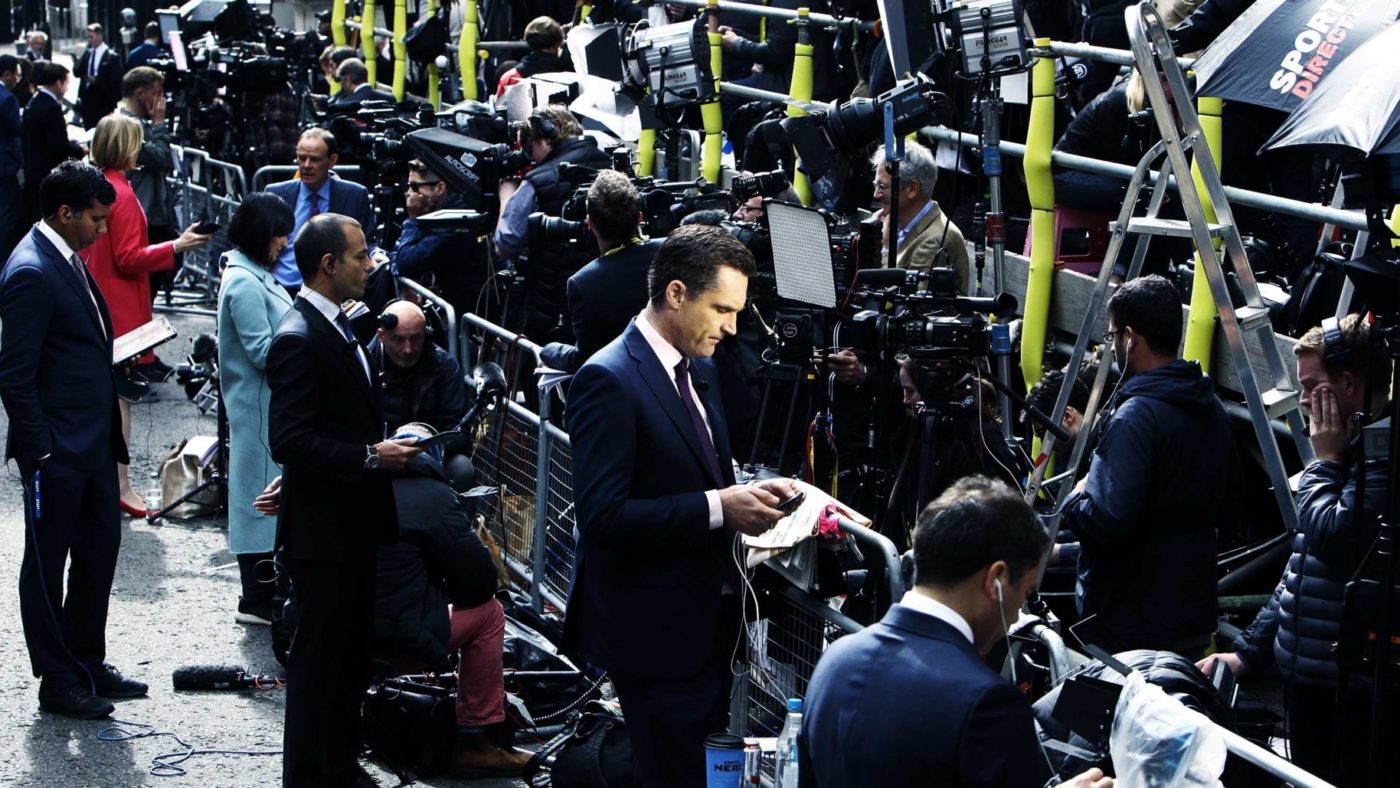The media is a key part of a free society. In order to hold power to account, citizens need information. But in most cases they don’t collect that information themselves – the flow of information is instead mediated. But how much are the mediators trusted?
It’s important at the outset to distinguish between levels and changes in trust. Trust (or, indeed, anything) can be high, low or somewhere in between, and it can also be rising, falling or stable.
Broadcasters (meaning the institutions) have traditionally enjoyed high levels of public trust. The Ofcom tracker survey has been finding that over 70% say they trust each of the main television networks on COVID-19 (the 4th and 5th points on a five-point scale), although only about half of those respondents said they trusted the broadcasters completely. And as OFCOM’s report notes, trust has declined slightly in recent weeks.
There is also polling from Kekst CNC showing that people in the UK (and also in the US, Germany and Sweden) are likelier to say that their confidence in the media has fallen than risen (net -21 in the UK). Polling changes in confidence or opinion (as opposed to polling levels at a point in time and comparing them to a previous point in time) is difficult, but in any case, this is not an encouraging finding for the media.
Journalists (without distinguishing between broadcast and print) have never been highly trusted. Ipsos MORI’s long running trust in professionals series has always put trust in journalists below 30% (and sometimes far below) since it began in 1983 – a low level, but a gradual increase in recent years.
On the other hand, YouGov’s tracker suggests that trust in broadcast journalists has fallen compared with earlier this century, although no further over the last few weeks. It also shows trust in most of the professional groups polled in longer-term decline too. It is difficult to be sure why these two series seemingly paint different pictures.
However YouGov polling on the specific issue of coronavirus – commissioned by Sky News – has been receiving a lot of attention within political circles in recent days, after it showed very low levels of trust in TV journalists (24% trust, 64% do not) with regard to coronavirus, on a level not that much better than newspapers (17% trust, 72% do not). Only 1% said they trust TV journalists a lot.
What explains this this lack of trust? The explanations I’ve heard fall broadly into two categories, the first of which is what could perhaps be termed the “unreasonable”. Might the public feel that this situation is basically a war, and therefore expects the media to be supportive of the government?
People are certainly behaving in this sort of “rally round the flag” way when it comes to voting intention and personal ratings (which, of course, is yet another reason why this type of polling is valuable even now, despite plenty of claims to the contrary). This might explain the reports and other qualitative signs of a backlash against media scrutiny.
Polling from Ipsos MORI looked specifically at journalists asking questions at the government’s press briefings, and found that by 43% to 28%, Brits thought they were doing a good job of holding the government to account. That 28% could be part of the story, but clearly not all of it.
There are also “reasonable” explanations for the public behaviour – in other words, that the public genuinely feels that journalists are not covering themselves in glory. This could be a case of an aversion to so-called “gotcha” journalism – designed to pressure politicians into newsworthy slip-ups rather than to elicit information of interest to the audience.
It could also reflect perceptions – right or wrong – that journalists are being either excessively or insufficiently tough in scrutinising the government. With that in mind, it’s worth looking at the breakdown of exactly whose trust in journalists is currently low.
YouGov’s coronavirus polling suggests that there is little variation by age, gender or social grade – trust net of distrust was very negative right across the board. But there was a substantial variation by politics, with trust being significantly lower among Conservatives (-57 net) and Brexiteers (-50) than the average (-40).
Of course, this could reflect the “unreasonable” theory – if people do view the media as unduly hostile, then it wouldn’t be too surprising if those supportive of the governing party and its flagship policy are likeliest to hold that view.
But it also applies to journalists generally, not just in respect of Coronavirus. It could also be that Tories and Leavers disproportionately view television as unfavourable to them in general. There is some evidence of this on Brexit, but the numbers are borderline on the left-right axis for BBC, ITN and Sky (although in both cases, the data is a couple of years old and large numbers chose the neutral or “don’t know” options).
As such, we can say that trust in broadcasters is high but has declined somewhat, while trust in journalists in the abstract has traditionally been low and remains so, and the evidence on how trust in TV journalists has varied (or not) over time is mixed, but any shift in recent weeks has not been dramatic.
The “collapse in trust” narrative isn’t backed up by the data. However there are other things – not least the chronically low levels of trust – for the mediators to reflect on.
Click here to subscribe to our daily briefing – the best pieces from CapX and across the web.
CapX depends on the generosity of its readers. If you value what we do, please consider making a donation.


